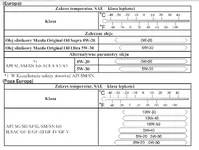GJ-Molestor
Banned
- :
- 2011 BMW 528i, 2015 Mazda 6, 1995 Nissan Maxima Manual
batmancx - I think it's insane to base your decision on observing the buying habits of local Walmart shoppers vs. following the recommendations of the automotive engineers who designed your engine.
GJ-Molestor - I've owned both the 2.0L (2003) and 2.3L (2005) versions of the Mazda L engine, and both called for 5W-20. Besides, you don't know the detailed design differences between the Mazda L engine family and the current Skyactiv family, and you don't know what the bearing clearances are.
The skyactiv motor is essentially the Mazda L engine with new pistons, the 4-2-1 manifold, probably a revised cylinder head and direct injection. If you remove the engine cover of the skyactiv and the older 2.5 they are strikingly similar. The block is the same and I highly doubt Mazda tinkered with the bearings specifically for the newer version... thats an uncecessary investment for a brand that doesnt have the money to do that even if they really wanted to. Your older Mazda L engine is specced for 5w20 because CAFE requirements already started to have effect then, so everywhere else in the world both the L and skyactiv engine use 5w30. Its just something to consider.
to be fair, batmancx did admit himself it was stupid and he wasn;t basing his decision on Wal-mart shelves, he was just pointing out an observation......
don;t give automotive engineers to much credit... these are the same ones who designed the CX-9 transfer case and the CX-9 water pumps that leak into engine.... tons of issue....
also the engineers are under tremendous stress to reduce costs anyway they can, you can see all the penny pinching they did, c'mon for example, seriously? giving the wrong size spares to AWD owners ???
and with CAFE fines up from $8 to $14 for every 0.1 mpg over per vehicle , you better damn believe they will do anything to save the company money with their high volume CX-5... just don;t think they have your best interest in mind, they're trying to keep their jobs
at the end of the day, this point is moot, no point trying to convince each other which way to go 0W20 vs 5W30, we're all grown ups, we make our own decisions and just live with it, there's no right or wrong , and in all honestly 0W20 vs 5W30 isn;t all that much different really, we're just beating a dead horse here.
My only issue with 0w20 is that it is not the correct oil for our bearing clearances and it degrades quicker then a thicker oil.
Bottom line, if you dont rev your engine hard and dont have hot summers, you dont really need 5w30 although its not going to hurt at all even in very cold weather.




